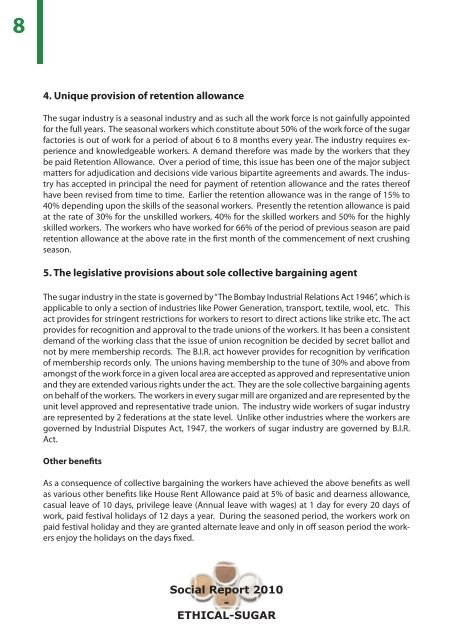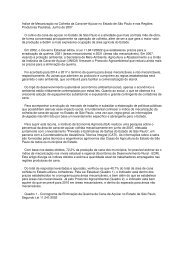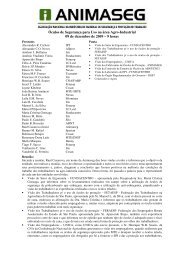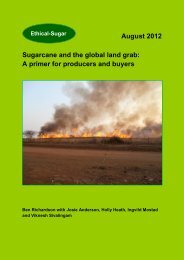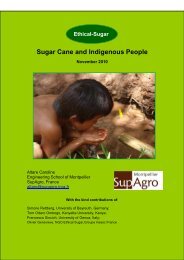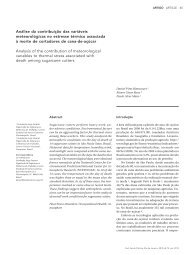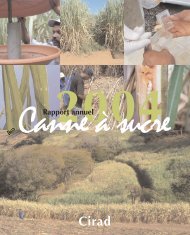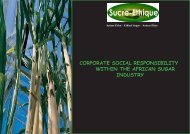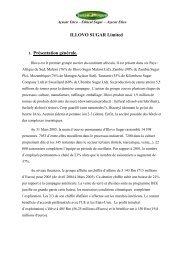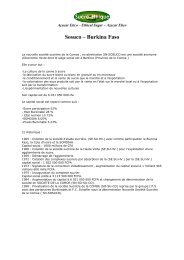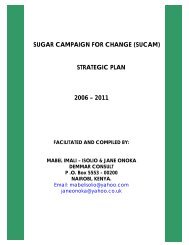Social Report 2010 â India - Sucre Ethique
Social Report 2010 â India - Sucre Ethique
Social Report 2010 â India - Sucre Ethique
Create successful ePaper yourself
Turn your PDF publications into a flip-book with our unique Google optimized e-Paper software.
8<br />
4. Unique provision of retention allowance<br />
The sugar industry is a seasonal industry and as such all the work force is not gainfully appointed<br />
for the full years. The seasonal workers which constitute about 50% of the work force of the sugar<br />
factories is out of work for a period of about 6 to 8 months every year. The industry requires experience<br />
and knowledgeable workers. A demand therefore was made by the workers that they<br />
be paid Retention Allowance. Over a period of time, this issue has been one of the major subject<br />
matters for adjudication and decisions vide various bipartite agreements and awards. The industry<br />
has accepted in principal the need for payment of retention allowance and the rates thereof<br />
have been revised from time to time. Earlier the retention allowance was in the range of 15% to<br />
40% depending upon the skills of the seasonal workers. Presently the retention allowance is paid<br />
at the rate of 30% for the unskilled workers, 40% for the skilled workers and 50% for the highly<br />
skilled workers. The workers who have worked for 66% of the period of previous season are paid<br />
retention allowance at the above rate in the first month of the commencement of next crushing<br />
season.<br />
5. The legislative provisions about sole collective bargaining agent<br />
The sugar industry in the state is governed by “The Bombay Industrial Relations Act 1946”, which is<br />
applicable to only a section of industries like Power Generation, transport, textile, wool, etc. This<br />
act provides for stringent restrictions for workers to resort to direct actions like strike etc. The act<br />
provides for recognition and approval to the trade unions of the workers. It has been a consistent<br />
demand of the working class that the issue of union recognition be decided by secret ballot and<br />
not by mere membership records. The B.I.R. act however provides for recognition by verification<br />
of membership records only. The unions having membership to the tune of 30% and above from<br />
amongst of the work force in a given local area are accepted as approved and representative union<br />
and they are extended various rights under the act. They are the sole collective bargaining agents<br />
on behalf of the workers. The workers in every sugar mill are organized and are represented by the<br />
unit level approved and representative trade union. The industry wide workers of sugar industry<br />
are represented by 2 federations at the state level. Unlike other industries where the workers are<br />
governed by Industrial Disputes Act, 1947, the workers of sugar industry are governed by B.I.R.<br />
Act.<br />
Other benefits<br />
As a consequence of collective bargaining the workers have achieved the above benefits as well<br />
as various other benefits like House Rent Allowance paid at 5% of basic and dearness allowance,<br />
casual leave of 10 days, privilege leave (Annual leave with wages) at 1 day for every 20 days of<br />
work, paid festival holidays of 12 days a year. During the seasoned period, the workers work on<br />
paid festival holiday and they are granted alternate leave and only in off season period the workers<br />
enjoy the holidays on the days fixed.<br />
<strong>Social</strong> <strong>Report</strong> <strong>2010</strong><br />
-<br />
ETHICAL-SUGAR


